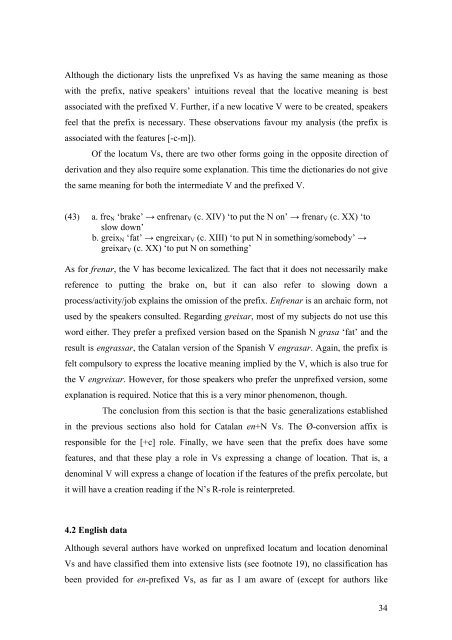Prefixation in English and Catalan - Departament de Filologia ...
Prefixation in English and Catalan - Departament de Filologia ...
Prefixation in English and Catalan - Departament de Filologia ...
Create successful ePaper yourself
Turn your PDF publications into a flip-book with our unique Google optimized e-Paper software.
Although the dictionary lists the unprefixed Vs as hav<strong>in</strong>g the same mean<strong>in</strong>g as those<br />
with the prefix, native speakers’ <strong>in</strong>tuitions reveal that the locative mean<strong>in</strong>g is best<br />
associated with the prefixed V. Further, if a new locative V were to be created, speakers<br />
feel that the prefix is necessary. These observations favour my analysis (the prefix is<br />
associated with the features [-c-m]).<br />
Of the locatum Vs, there are two other forms go<strong>in</strong>g <strong>in</strong> the opposite direction of<br />
<strong>de</strong>rivation <strong>and</strong> they also require some explanation. This time the dictionaries do not give<br />
the same mean<strong>in</strong>g for both the <strong>in</strong>termediate V <strong>and</strong> the prefixed V.<br />
(43) a. freN ‘brake’ → enfrenarV (c. XIV) ‘to put the N on’ → frenarV (c. XX) ‘to<br />
slow down’<br />
b. greixN ‘fat’ → engreixarV (c. XIII) ‘to put N <strong>in</strong> someth<strong>in</strong>g/somebody’ →<br />
greixarV (c. XX) ‘to put N on someth<strong>in</strong>g’<br />
As for frenar, the V has become lexicalized. The fact that it does not necessarily make<br />
reference to putt<strong>in</strong>g the brake on, but it can also refer to slow<strong>in</strong>g down a<br />
process/activity/job expla<strong>in</strong>s the omission of the prefix. Enfrenar is an archaic form, not<br />
used by the speakers consulted. Regard<strong>in</strong>g greixar, most of my subjects do not use this<br />
word either. They prefer a prefixed version based on the Spanish N grasa ‘fat’ <strong>and</strong> the<br />
result is engrassar, the <strong>Catalan</strong> version of the Spanish V engrasar. Aga<strong>in</strong>, the prefix is<br />
felt compulsory to express the locative mean<strong>in</strong>g implied by the V, which is also true for<br />
the V engreixar. However, for those speakers who prefer the unprefixed version, some<br />
explanation is required. Notice that this is a very m<strong>in</strong>or phenomenon, though.<br />
The conclusion from this section is that the basic generalizations established<br />
<strong>in</strong> the previous sections also hold for <strong>Catalan</strong> en+N Vs. The Ø-conversion affix is<br />
responsible for the [+c] role. F<strong>in</strong>ally, we have seen that the prefix does have some<br />
features, <strong>and</strong> that these play a role <strong>in</strong> Vs express<strong>in</strong>g a change of location. That is, a<br />
<strong>de</strong>nom<strong>in</strong>al V will express a change of location if the features of the prefix percolate, but<br />
it will have a creation read<strong>in</strong>g if the N’s R-role is re<strong>in</strong>terpreted.<br />
4.2 <strong>English</strong> data<br />
Although several authors have worked on unprefixed locatum <strong>and</strong> location <strong>de</strong>nom<strong>in</strong>al<br />
Vs <strong>and</strong> have classified them <strong>in</strong>to extensive lists (see footnote 19), no classification has<br />
been provi<strong>de</strong>d for en-prefixed Vs, as far as I am aware of (except for authors like<br />
34
















